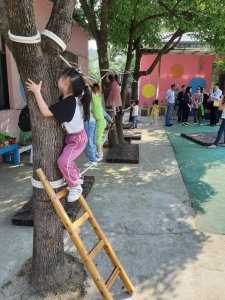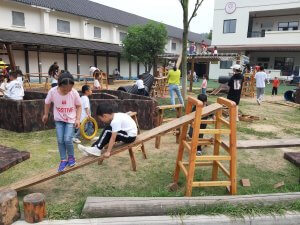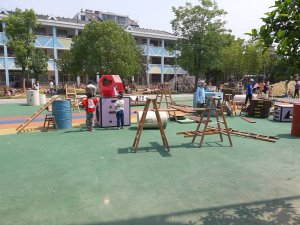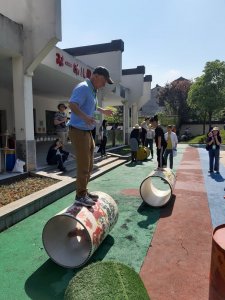Table of Contents
We were invited to the 1st International True Play Conference and to become a founding member of the True Play Advocacy Alliance. The event brought together nearly 300 experts and was hosted by Anji Play, a revolutionary initiative in China promoting what they call true play. During the week spent in Anji County we visited several kindergartens implementing the true play curriculum, participated at the conference with leading scholars in the field and learnt how they engage the parents in all Anji Play activities.

Revolutionizing Early Childhood Education with Anji Play
True play kindergartens are revolutionary in China where play in any form is not a regular part of daily kindergarten life. This is true for most of the Far East, but colleagues from the USA also said that play is less and less part of their pre-schools, and there are some similar experiences from a number of European countries. The Anji approach goes beyond what is usually experienced as play in kindergartens as it lets the children take the lead and offers a lot of material – much of it would be considered dangerous by national standards in the USA or in the EU – to create their own play spaces with water, sand, paint, ladders, planks, barrels, etc.
The programme is based on five principles: Love, Risk/Adventure, Joy, Engagement and Reflection. Children have amazing learning outcomes, closely followed by teachers who do not interfere with the learning being observers only. They are way ahead of their peers attending regular kindergartens – that are highly academic in China.

Parental Engagement in Anji Play
For success they had to win the parents, too. They started by opening up kindergartens: parents can come anytime to personally experience what their children do and enjoy there. Parents can come to the kindergarten to play with their children there, too. They also provide a parent academy as well as individual discussions with parents. These are used to analysing photos and videos of their own children with the teachers.
When new material is introduced in the kindergarten or rearrangements are planned, parents are engaged in decision-making. By this they have managed to convince parents of the importance of play and that the “risky” play forming the basis of the programme is not harmful for their children. As preparation for kindergarten they also invite parents of children aged 0 to 3 to the kindergarten a few times per semester and they also offer possibilities for them to bring their toddlers in.

Inclusivity and Future Directions
True play kindergartens are also truly inclusive. Not only do they allow children with special education needs to attend alongside other children, but equity and inclusion are integral to the true play philosophy. Children on the autism spectrum, for example, often leave kindergarten in much better condition than when they entered. They also have numerous success stories with children with restricted movement or speech abilities.
The entire methodology is based on observing the child, reflecting on the observations, and catering to the needs of each individual child. Even the spaces are designed according to children’s needs, based on observation, rather than by an architect or the kindergarten head.
Currently, they are working to change teachers’ and school heads’ mindsets to introduce play in primary schools. Primary teachers often say that Anji children enter school with much higher-level skills than others; they thrive at the beginning of school, but they underperform after some time, not being used to the top-down approach of schools. As teachers and school heads visit the Anji Play kindergartens, they can observe the learning taking place there. They also visit primary schools to demonstrate how the approach could be introduced and discuss teachers’ concerns.
They aim to implement small changes in schools, such as introducing timetables that better suit children. In Anji Play kindergartens, books are readily available everywhere. They hope to see this in schools as well, along with more engaging materials. Primary teachers recognize the need for change, so hopefully, it will happen over time.
Insights from Experts

During the conference we had the opportunity to listen to a large number of leading experts from all over the world as well as to statements by kindergarten heads who have taken the Anji Play journey. This space does not make it possible to give a full report. This is just a short recap of some messages that target parents directly.
Lawrence Cohen called the audience’s attention to basic needs of children: love, health, nutrition, be respected and play. He also recalled that if children are measured against pre-set expectations, it often leads to considering them as failure. Reflecting on risky play he emphasised that safety and risk are not opposites, you need to feel safe in order to take risks. Parents and other educators often worry a lot out of care, but we need to remember that the opposite of worry is not calm serenity, but trust (in relationships, in resilience, in children’s abilities).
He called for parents and schools to offer opportunities for taking risks. He highlighted that a child will recover more from a broken arm than being timid. He called for strong adult leadership to make this kind of learning a reality for all children. This includes school leadership for changing parents’ attitudes and for inclusion.
David Whitebread, the recently retired director of PEDAL Cambridge reminded everybody that risky play is crucial in developing resilience, self-reliance, learning to manage risk, but also for well-being and mental health. His message for parents who try to organise ‘meaningful activities’ for all moments of their children’s time spent awake is that less structured time leads to much better self-regulation, so you should be brave not to supervise your child all the time and offer them much more unstructured time. Don’t worry about them being bored.
His message was also underlined by other speakers. Frances Rust called all educators – and parents as the primary of them – to aim at enculturing children and young generations for a knowledge-building civilisation. We need to re-define the aim of formal education for this and focus on enabling the learner to develop autonomy.
As a founding member of the True Play Advocacy Alliance our message to parents and professional educators is the following:
Even abusive parents want the best for their children. But parents may not be aware of what is best for their child or even that they are abusive. Depriving children of the right to the right education that makes it possible for them thrive and depriving them of play is abuse.
The play revolution that would end this abuse needs convinced and convincing professionals that are trusted by the parents and can then create a partnership with professionals making parents understand that play is education and they can only stop being abusive by letting their children play truly.
So, parents are the key – it may not come as a surprise from Parents International -, but professionals have a major responsibility in supporting them. Just like Anji Play is doing it.
All photos were taken with permission of parents and the children themselves.
More from Parents International
Tackling Inequalities in Early Years
Reconceptualising Early Childhood Literacies